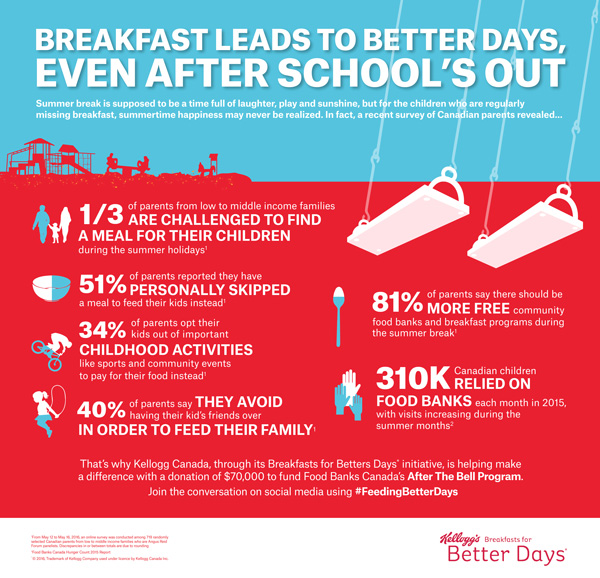Food insecurity can peak for families with children during July and August
Most Island kids look forward to a summer of activities and adventures, but for one out of every five children, hunger cuts the fun short. Summer hunger is a form of food insecurity and is the result of many combining factors: school-based breakfast and snack programs end in June, babysitting and other summer activities add extra costs to the family budget, and food bank donations often drop off during the warmer months.
Several schools across the province, including O’Leary Elementary School, have breakfast and snack programs during the school year. “The breakfast program is open to all. It’s three mornings a week, including a hot breakfast on Thursdays,” said Susan Trail, principal of O’Leary Elementary. About five percent of children at the school take advantage of the snack program each day, supplementing or even substituting for the lunch they bring from home. In June, when school lets out the programs stop, but childhood hunger doesn’t.
Kellogg’s Canada surveyed low- and middle-income families across Canada in 2016, with some alarming findings. One-third of these Canadian parents struggled to feed their children breakfast in the summer. Forty percent of these parents were so challenged to provide food, they avoided having kids’ friends over on summer break and 34 percent had to opt out of sports and community events for their children during the summer so they could pay for food instead.
The West Prince Caring Cupboard in Tyne Valley noted a significant increase in the number of children using the food bank last summer. Sixty-six children and 77 families were served by this small food bank in the summer of 2016. Compared to the fall of 2016, there was a 106 percent increase in the number of children and 42 percent increase in the number of families using the food bank over the summer. The busiest times were at the very beginning of summer and the very end of summer, when school supplies and other back-to-school expenses were likely competing with families’ food budgets.
Christine Gallant, the organizer of Soul Soup, a free year-round lunch program at the Church of the Nazarene in Summerside, also noticed a bump in attendance last summer, including more families with school-aged children. “In the summer, it really kind of ballooned, which was interesting. We thought it would really shut down for the summer. The summer was our largest regular groups we were seeing,” said Gallant. The Upper Room Soup Kitchen in Charlottetown also indicated they see an increase in the number of meals served over the summer months.
Recognizing a need to feed children over the summer, Food Banks Canada initiated After the Bell, a program that supplies mini-meal packs containing a week’s worth of nutritious, kid-friendly snack foods, as well as local fresh fruits and vegetables. Last year 12,000 meal packs were distributed to 1,500 children in Ontario and Saskatchewan through local food banks. This year 30,000 meal packs (each containing 10 snacks) will be distributed to children in four provinces, as the program is rolled out to include Quebec and Nova Scotia. The program is open to all food banks that meet two criteria: they must have a way to distribute the meal packs, such as partnerships with children’s programs or schools, and they must have facilities such as refrigeration, to safely store the fresh produce. This year, no food banks on PEI applied for the program.
School is at the centre of most of our children’s lives and is an ideal way to reach hungry children across PEI, from September to June, but more attention needs to be paid to issues of summer hunger. To help alleviate childhood hunger, individuals can look to support Island food banks and food security programs. As well, Islanders can lobby for and/or support efforts to create new programs that target this time of year, which is a difficult one for many families on PEI.
- BURGERS TO BLOSSOMS AT GARDENS OF LIFE - April 1, 2019
- SIGNED, SEALED AND DELIVERED - February 1, 2018
- What a Waste? - January 1, 2018
- A New Face For a Familiar Tignish Tradition - December 1, 2017
- Cultivating a Forest of Food - November 1, 2017
- Our Day on the COPC Farm Tour - August 1, 2017
- Municipal Bylaws Prohibit Livestock - August 1, 2017
- The Sky is Falling, The Sky is Falling! Or, is it? - July 1, 2017
- No Summer Break For Childhood Hunger on PEI - July 1, 2017
- Creating Community - May 1, 2017

